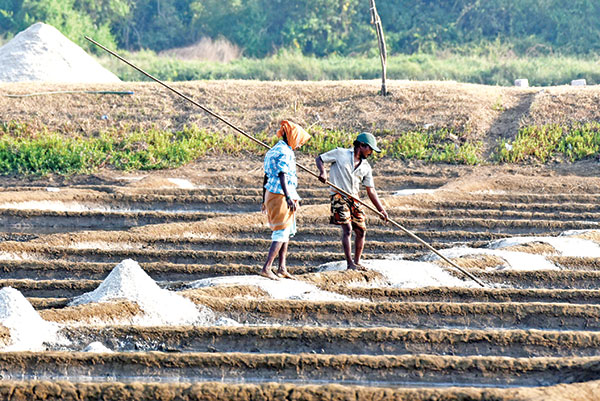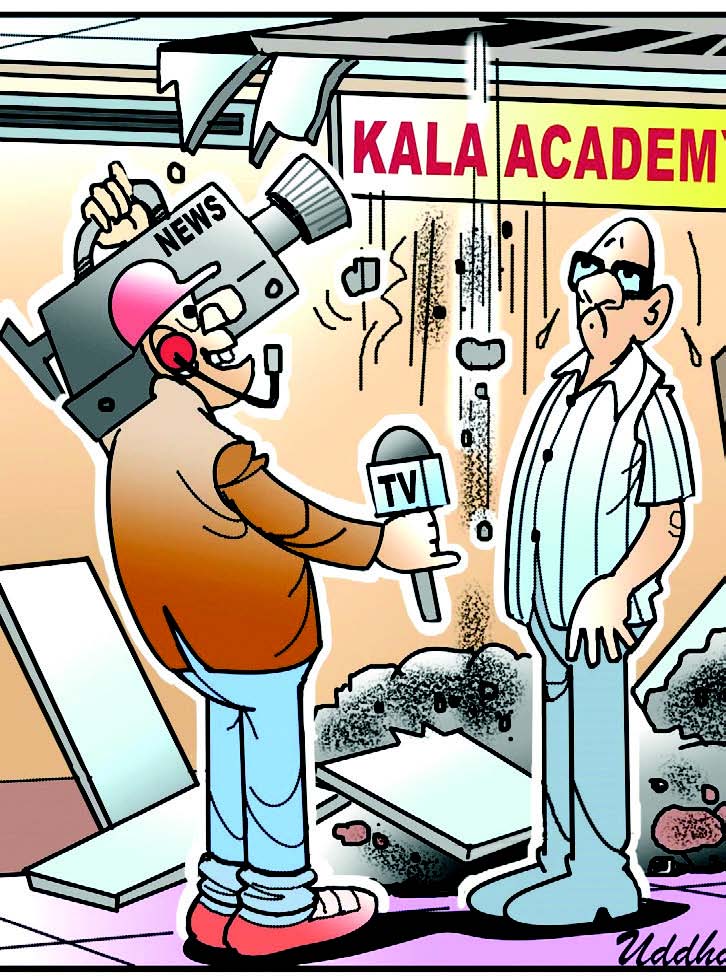
People of Goa irked over the change of name resembling that of Goans by the migrants, scam in recruitment process, majority of government jobs being sold out to outsiders, heavy emigration of educated youths, clashes with outsiders over illegal encroachment of land, furious over the issue of delay in settling the claims of Alvara land holdings, outsiders capturing the local market, heavy influx of migrants and ample of such issues cited on the daily basis are making Goans go uneasy.
The claim of vast land of Goa being infringed by high-profile people and hoodlums for their political benefit is also prevailing. Afraid of losing their rights over numerous such issues posing a threat to identity of this beautiful land, Herald spoke to few people to learn the challenges faced by the State to preserve its own identity.
“The Goa Bhumiputra Adhikarini bill 2021, though is lapsed can be re-introduced when next government comes into power. We should stay united to cope up with such issues”, responded Jawaharlal Shetye, a RTI activist and President of Mapusa People’s Union.
Adding further Shetye said, “Politicians promise to protect Goa’s identity by safeguarding the rights of Goans but fail to bring it to the reality. Common man should not fall prey for fake assurances of these politicians but should unite to fight for their right and to protect the identity of Goa”.
Stating that the government must act fast to protect the interest of bhumiputras (the son of soil), “a mass drive should be launched to reclaim the State-owned land from migrants and the illegal occupants”, added Shetye. Adding further he said, “for the past few years, request of granting a special status to Goa is taking rounds in the political and social circles in the State, which has been facing challenges stemming from rapid in-migration, shrinking land resources and a resultant dilution of identity.”
“Influx of migrants plays a major role in altering the political scenario of Goan politics. The migrants acquire open spaces, build huts upon entry and eventually end up building a concrete structure on the space they had encroached temporarily. These illegal structures getting legal rights upon receiving blessings from our politicians is sad truth posing major threat to Goa’s identity,” he added.
Roman script
Senior Konkani activist and former Speaker of the Goa Assembly Tomazinho Cardozo in his response said that, “The language is the main factor that is to be conserved to preserve the identity of a particular State. The majority of Goans may it be Hindu, Muslim or Catholic all wish to imitate the Western world. Our younger generation is shy to speak in their mother-tongue. They prefer talking in English rather than in Konkani even when at home.”
“The identity of any place depends on its local language. If we give up on talking in Konkani in our daily life then definitely Goa will lose its unique identity,” added Cardozo.
“Young generation is not at fault alone. The State authorising body also has failed to amend certain rules in the interest of Goa and Goans”, alleged Cardozo. Stating further he added, “97 schools out of 137 changed their medium to English since it was becoming difficult for the traditional Roman script writers to learn Konkani in Devnagri script. If Goa Official Language Act 1987 had a provision to make use of Devnagri as well as Roman script Konkani as the official language of State, the Catholic community of Goa would have never demanded English as the language for primary education but would have opted for Konkani in Roman script. This would have strengthened the position of Konkani language in Goa”, added Cardozo.
Explaining the Goa official Language act in brief, Cardozo said, “The official language gadget that reads “Konkani language” means Konkani language in Devanagari script should be amended to ‘Konkani means Konkani language written in Devnagri and Roman script.'
“Roman script Konkani is losing its shine due to the injustices done to the people of Goa who have traditionally been writing in their mother tongue. The failure to amend the language Act is posing risk to identity of Goa. We demand equal status to Konkani in Roman script”, he added.
Change in names
Delving with this issue, Ashok Naik, the President of Gomantak Bhandari Samaj, said, “Migrants change their names to Goan ones and produce the documents fearlessly, manipulating things with the help of local bodies. We don’t object the change in name but the surname.”
“The State cabinet has given an approval to restrict non-Goans from changing their names resembling that of Goan surnames, which necessitates either the applicant's parent or grandparent must be registered in Goa. We would like to question the government onto which birth year is to be considered as a base year to permit a person for his/her name change? Or is the new law approved keeping a loophole of no clear mention about the base year a master plan to give legal rights to the migrants?” questioned Naik.
“Changing the name to that of a Goan allows the respective person to issue all the legal documents including driving licence, caste certificate and others. This particular individual becomes eligible to avail the government schemes, issue an employment card and grab the comunidade land and to enjoy the benefits and schemes afforded to the Niz Goemkars by the State government. They aren’t just changing the name but also stealing our identity”, stressed Naik.
“The authorities allowing this name change for greed of couple of bucks fail to understand that these aren’t mere words but the surnames that indicate the origin of Goan community based on their caste, locality and business”, Naik said further.
Citing one such instance, Naik said, “by changing the names which resembles to the Goan surnames, outsiders impersonate dead people or lay claim to inheritances”.
Stating further he said, “The Goa Change of Name and Surname Act, 1990 was introduced to make it easier for Goans to change their name in case if misspelled during Portuguese times. The act is being now misused by the political delegations for creating their vote bank. The misery is that, Goans with foreign passports do not get the voting rights while non-Goans settled in Goa are offered the same.”
Stating with an example to how Goans are always abandoned when it comes to government job recruitment to how they have to struggle when it comes to construction of even a single room on their own land, Naik said, “we should unite to fight for our right. I urge Goans and the Non-governmental organisations (NGOs) to raise their voice against the injustice and illegality irrespective of religion and caste. We are Goans first and then a Hindu, a Muslim and a Catholic.”
Khazans, toddy tappers & salt pans
“The Khazhans is our identity. To maintain it, the tenants association should be handed over to the active farmers rather than passive farmers. But unfortunately the government is not taking any firm initiative to protect this land. The level of corruption done by the authorities maintaining the khazans has become so dominant that it is de-motivating the farmers to cultivate these lands any further”, replied Prasad Haldankar, former Sarpanch of Navelim.
“Khazan lands are the traditional farmlands specific to Goa. These highly cultivable lands are self-sustainable and require no fertiliser but are sustained on compost produced from dead and decomposed leaves”, added Haldankar.
Citing with an example Haldankar said, “Crop varieties such as korgunt, aasgo of Tiswadi Taluka was in high demand. The crops grown were well known for its taste and since no fertilizer was used, the product so produced was healthy. With Khazans not in place, what we have to eat is the polished rice and the ones which are produced with the help of fertilizers.”
Adding he said, “during Portuguese era, the mechanism of sluice gate was developed for the smooth operation of agriculture, which now has been totally misused for the greed of money. The governing body responsible for the operation of sluice gate operates it merely to earn revenue out of fishing without taking into consideration the aspect of farmers and farming; the year long inundation of khazan lands speaks it louder than the words.
“Most of the bunds are deliberately broken to inundate the fields and carry out the fishing activities,” alleged Haldankar.
Speaking in agreement, Arturo D’souza, a social activist said, “Salt pans (Mithagar or Mithache agor) form a part of the reclaimed waterlogged khazan lands, which were also utilised for aquaculture, pisciculture and agriculture. Goa being a coastal State, salt farming was one of the traditional businesses of Mithgaudas and Gauda community. Goan structure of farming with traditional salt pans (Mithache agor) is unique identity cherished by the people of Goa. Losses incurred due to damage caused to embankments have affected Goa’s traditional business of salt production.”
Citing a reason D’Souza said, “With increased human interference, water abstraction, habitat destruction and unsustainable tourism, Goa is losing its traditional business of salt farming, added D’souza.
Noted scientist and environmentalist, Dr Nandakumar Kamat in his response said, “In the last sixty years, Goa has lost its thriving toddy tapping business, predominant agrarian structure, rural ethos, public natural commons such as pastures, vegetated green hills and picturesque hill slope, green belts and open recreational spaces.”
“With heavy political interference, mismanagement, malpractices and corruption, Goa has lost its self-sustaining village comunidades or the Gaonkari system and face of its traditional markets and weekly bazars.”
“This is not all. There are ample of such challenges posing threat to the identity of Goa. Therefore, now the ball lies in the court of Goa’s half million young and educated voters to identify the things and work together to protect them”, added Kamat.
Heritage sites
“Natural beauty of Goa, heritage sites are at the mercy of builders in nexus with politicians. Our heritage hills at Taleigao being blatantly cut, historical buildings such as the PWD obras publicas, National theatre building praca de commercio being slated for demolition, paddy fields being filled up, trees being cut, unique sculptures and forts being desecrated in the name of renovation, natural habitats being destroyed is changing the entire map, threatening the very identity and existence of Goa and Goans, said Prajal Sakhardande, a historian and member of Goa Heritage Action Group .
Citing the example of Aguada jail, Sakhardande said, “The heritage character of these buildings is plucked out by destroying their original facet. Goa does require a Special Status to help preserve its identity. We have been demanding the grant of Special Status and had also presented the petition to the Prime Minister Narendra Modi in this regard, but in vain”, added Sakhardande.
